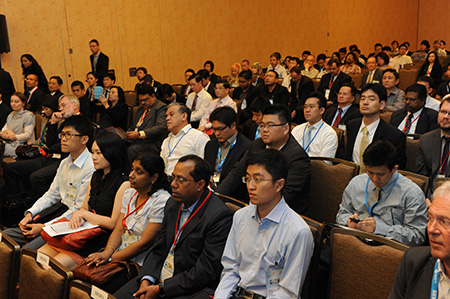
Attendees of the Asia Smart Grid event had a lively discussion with transportation experts.
Transportation experts looked into the future of intermodal transport and vehicle sharing – and cited opportunities and roadblocks along the way – as an Asia SmartGrid panel yesterday looked at experience and developments in Singapore and Germany.
Eugene Ng, Director, Urban Solutions, Bosch Software Innovations (Singapore) pointed to the impact of changing lifestyles as he explained why the use of more than one mode of transport -- including the option of car sharing – will become more commonplace in a single journey.
“The lifestyle changes of people actually allow different mix of transportation to be offered”, said Mr Ng. Among other reasons behind the switch, he said, are congestion, environmental concerns and population pressure which compelled cities to prioritise public transportation over private cars.
He also pointed out that private car ownership might also become less of a priority among an ecologically-sensitive younger population. Commuters will increasingly mix multiple transport options dependent on costs, ecological impact and ease-of-use.
Mr Ng also said that technological advancements such as smartphone applications have the potential to make intermodal transportation easier. As an example, he cited a train journey from Ang Mo Kio in the north of Singapore to Jurong in the west and -- assuming no public transport access to the final destination – how a smartphone application would give the user the option to book a “car share” to complete the journey.
The panel’s core premise was that many car manufacturers see their future business shifting from the production and sales of vehicles towards offering transport and connectivity services in a general sense.
Singapore’s geographical size, however, creates challenges for car sharing. For example, car sharing operators here may only be able to provide a “two way” journey option – requiring users to return the vehicle to the original collection point – because of difficulties in distributing the vehicles in the small city state.
In contrast, the prospects for car sharing in Germany seem bullish. Registered users for car sharing have doubled within the last 5 years. As of 2013, there are about 270,000 registered users, an increase of 22.7% compared to 2012. The younger generation seeking new mobility concepts instead of owning a car is one factor – but strong ties forged between local authorities and commercial partners are also one of the key enablers in making the concept of car sharing possible.
In contrast to Singapore, Germany’s size means there are many destinations that cannot be reached by public transport making car sharing a very realistic transportation option.
“Unfamiliarity with the public transport network, timetables and tickets” remains one of the key hurdles regarding intermodal transportation according to Heleen Wilmink, Traffic Technology and Traffic Management, BMW Group (Germany).
Despite these challenges, Germany is envisaged to be the leading provider and market for electric mobility by 2020. In the initial phase from now until 2014, Germany will conduct research and development to prepare the market; phase two will include market development through to 2017 – including setting up the vehicles and facilities; and the stable business concept with a high-volume market will then be established up to and beyond 2020.
BY : Tay Kai Soon, EMA